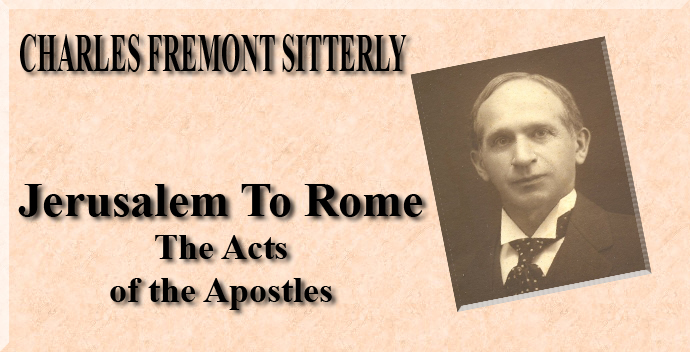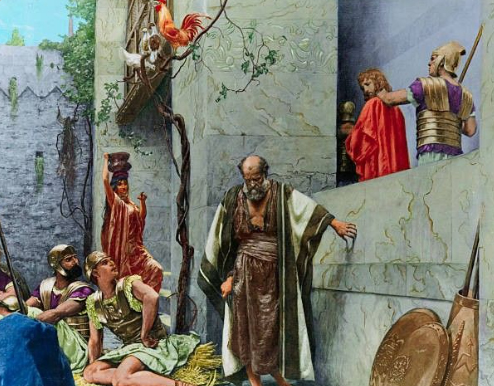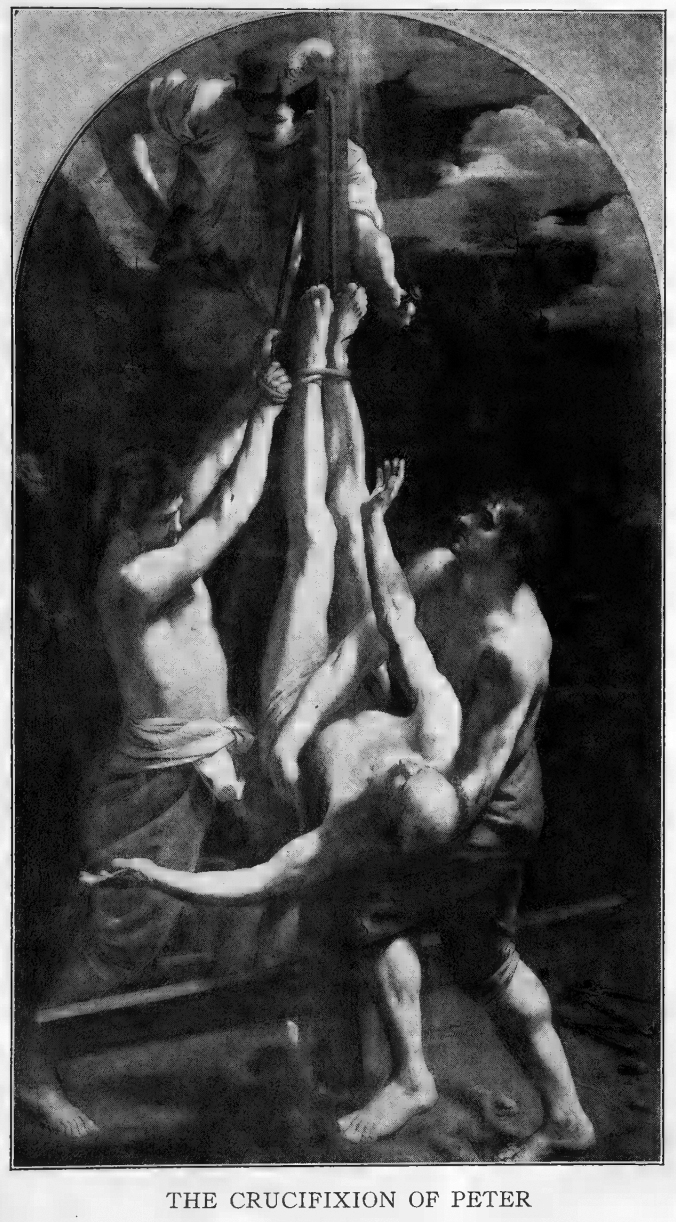|
Then Paul, with his gaze fixed on the Sanhedrin, said:
“Brother men, I have lived with an utterly clear conscience before God to the present day.”
Then Ananias, the High Priest, ordered those standing near Paul to strike him on the mouth.
Upon that Paul said to him:
“God is about to strike you, you white-washed wall! And do you sit there to judge me according to the law, while contrary to the law you order me to be struck?”
“Do you mean to revile the High Priest of God?” exclaimed the bystanders.
“T did not know, brothers,” replied Paul, “that he was the High Priest; for it is written, “THOU SHALT NOT SPEAK EVIL OF A RULER OF THY PEOPLE’” (Exod. xxii, 28).
When, however, Paul recognized that part of the Sanhedrin were Sadducees and the other part Pharisees, he called out among them:
“Brother men, I am a Pharisee, a son of Pharisees. It is for the hope of the resurrection of the dead that i! am being tried.”
When he said this, dissension broke out between the Pharisees and the Sadducees and the assembly was divided, for Sadducees claim there is no resurrection nor angel nor spirit; Pharisees, however, believe in both.
Thus a great uproar broke out. Some of the scribes on the side of the Pharisees, leaping up, began a fierce contention :
“We find nothing wrong in this man here. What if a spirit or angel has spoken to him?”
Then the dispute became so violent that the Commander feared the people would tear Paul to pieces, so he ordered the troops to come down and rescue him from them and bring him inside the castle.
|
|
It is quite probable that the gathering spoken of in this chapter was not a regular meeting of the Sanhedrin with the High Priest as president, but that the Tribune Lysias was in the chair, with his own deputies at the secretary’s desk. Nevertheless, the body of the assembly was the Sanhedrin, and to it Paul spoke. Paul’s fixed gaze is frequently mentioned by Luke as peculiarly penetrating, if not irritating, to his enemies, and either because he singled out the High Priest unconsciously, and steadily addressed his opening remark, as if it were personal, to him, or because of its tone, or because his insistence upon the integrity of his course rather as © “citizen” than as “Hebrew” threatened to sidestep the entire issue, it threw Ananias into a towering passion. He made an effort to rise, angrily shouting,
“Strike that man down! Silence him!”
It is so unexpected a blow that for an instant Paul is unhorsed and answers in kind. Still, his words remind us so strongly of the Saviour’s concerning hypocrites that when Paul adds a quiet apology we at once forgive him. Dr. Ramsay thinks that Luke was not present at this hearing and only gives the briefest sketch of Paul’s speech, getting his points directly from Paul. Thus the apparent abruptness of his next move in dividing the assembly is explained by his only telling the end and not the process which led thereto. After such a violent outbreak at the beginning on the part of the High Priest himself it must have been clear that no favor would be given him in any case, and so Paul’s wits worked unerringly again at once to the confusion of his enemies, the pressing and proclaiming of the main issue, Christ’s resurrection, and the saving of his own neck. Though Ananias and his intimates are Sadducees, the majority are Pharisees, and their scribes, who have not been recognized at all by the Tribune, leap into prominence, bring forth their scrolls, and begin to quote chapter and verse in proof of the
life after death, angels, spirits, and the like, shouting in Paul’s defense that an angel or spirit might well have appeared to him, and that in their rejection of his testimony to such things they had best beware lest they be found contending against God. The Tribune again sees these religious bigots falling into confusion worse confounded and abruptly ends the hearing. This is now the third time that he has been compelled within the span of a single day to break up a religious assembly in the courts of Jehovah’s Temple and to rescue from death one of Jehovah’s prophets.
|
|
That night the Lord stood by Paul and said,
“Take courage, for as you have bravely testified about me at Jerusalem, so must you testify also in Rome.”
When daylight broke, the Jews planned a conspiracy and took oath that they would neither eat nor drink till they had killed Paul. There were more than forty who made this plot. Then they went to the High Priests and elders and said:
“We have taken solemn oath to taste nothing till we have killed Paul. Now, then, you of the Sanhedrin, let the Commander know you want him to bring Paul down to you, as if you were about to investigate his case more carefully, and we are ready to kill him before he gets near here.”
|
|
Paul is granted a visit from his King that night as his troubled spirit reviews in its perplexity the doings of the last three days. “The Lord stood by Paul.” He finds him sleeping, or praying more probably, in Antonia. He gives him encouragement, especially on the point of his steadfastness in testifying to his Master in Jerusalem where his work is now ending, and on the further point, which needs some clearing, as to his destiny respecting Rome. Paul then sleeps long and late and gets much needed rest for the exciting scenes to follow. The developments follow fast. Forty assassins were plotting Paul’s death while he leisurely breakfasted and received Luke and Trophimus in the castle. The conspirators were good Jews of the Judas Iscariot type and were received in close conference at the High Priest’s palace and given a last hearty meal at the expense of Jehovah’s treasury. They pledged one another too frequently, as the oath was taken that this would be the last drink till they had spilled Paul’s blood, and then some one or more of them went out and indiscreetly asked some of his friends to the killing. It was to take place, they hoped, at the latest the following morning when Paul was on his way down to a final hearing, not yet arranged for, to be sure, but probably at the court of the High Priest Ananias. When some one asked how they expected to overcome the Roman escort they jauntily replied,
“There are forty of us armed to the teeth, and there are others who will be on hand for the rush at the right moment.”
|
|
But Paul’s nephew heard of the ambush, so he went over and entered the castle and told Paul, and Paul called one of the centurions and said,
“Take this young man to the Commander, for he has something to tell him.”
So he took him along to the Commander and said:
“The prisoner Paul called me to him and asked me to bring this young man to you. He has something to tell you.”
Then the Commander, taking his hand, led him aside and began to ask, “What is it you have to tell me?”
“The Jews,” he answered, “have agreed to ask you to bring Paul down to-morrow to the Sanhedrin, as if about to inquire more carefully about his case. So, then, do not let them persuade you, for more than forty men of them are lying in wait for him and have taken oath neither to eat nor drink till they have killed him. They are even now ready, anticipating the assurance from you.”
Then the Commander let the young man go and cautioned him,
“Tell no one that you have given me these facts.”
He summoned two of his centurions and said,
“Get ready two hundred soldiers to proceed to
Caesarea, also seventy horsemen and two hundred spearmen by nine o’clock to-night.” Provision was also made for Paul’s mount to carry him safely to Felix the Governor.
|
|
Paul’s family now breaks into the foreground. Blood is thicker
than water, and Jewish households are usually not small and rarely disloyal to household interests. Paul’s constant reference to his citizenship as a native of Tarsus, during these days of trial, and to his upbringing and like subjects, goes with the views of many moderns that his fortunes had recently changed, that possibly his father had lately died and he as oldest son had come into property. In his recent letter to the Romans there are indications that members of his family were Christians and in good social standing at Rome. Here the reception of Paul’s nephew both by prisoner and Commander reflects the same condition, and the fact that at
Caesarea later Paul was so constantly the object of marked attention on the part of the Roman authorities, and especially that the Procurator Felix, a notorious millionaire himself and blood brother of “Pallas, the richest man in Rome,” endeavored to inveigle Paul into the purchase of his liberty by money, gives ground for this contention. Paul’s family learns of the plot just in time to save him. The story is detailed in full in Luke’s inimitable way and nothing can add to its vividness or appeal.
|
|
He also wrote a letter of which this is a copy.
“Claudius Lysias to his Excellency Governor Felix, greeting.
“This man Paul had been seized by the Jews and was on the point of being killed by them when I came upon them with the troops and rescued him, as I had learned
that he was a Roman citizen. Moreover, as I was anxious to understand the accusation they had against him, I took him down to their Sanhedrin. There I found that he was accused about matters of their law and that there was nothing charged against him deserving death or imprisonment. Now, however, I have learned of a plot against the man, so I send him on to you at once, while I also notify his accusers to plead their case against him before you. “Farewell.”
|
|
This letter of Claudius Lysias is no doubt an exact copy of the original. The word translated “copy” does not signify that Luke has given a reconstruction of it from his imagination, as many think. The contents just as given, judged by psychological tests and internal evidence, accredit it as genuine. Luke’s methods, as well as advantages, in obtaining it make also in this direction. The standpoint of the writer is one that none but Lysias would take or set down, and its air of verisimilitude altogether fixes it as his own. This is the first of many documents connected with this notable case, reviewed and repeatedly argued at the seat of government in
Cęsarea and finally transferred to the Imperial Courts at Rome and Luke could obtain it without difficulty.
|
|
The soldiers, according to their orders, took Paul and conducted him by night as far as Antipatris. The next day they returned to the castle, leaving the troopers to proceed with him. They arrived at
Caesarea, delivered the letter to the Governor and also presented Paul before him. After reading the letter he asked what class of province he was from, and learning it was Cilicia, he said,
“T will give full hearing to your case whenever your accusers also have arrived.” Then he ordered him to be kept in Herod’s pretorium.
|
|
One cannot resist the temptation to point to the compliment
paid Paul again in the size and equipment of the cavalcade, which aggregated half a thousand well-equipped Roman troops, as they
rapidly move through the night conveying him from castle Antonia to Antipatris, the outlying garrison town overlooking
Caesarea, over thirty miles from Jerusalem. From Antipatris the cavalry with Paul trot on, while the foot-soldiers return to their barracks in Antonia. No doubt by nightfall Paul rode with his troopers across the bridge and beneath the portcullis of the east gate of
Cęsarea, to his own great physical relief and the proud satisfaction of the centurion who had him in charge. They ride to the palace of the Procurator and deliver the letter of the Tribune. Felix at once reads it, has Paul brought into his presence, inquires carefully as to his citizenship so as to understand whether he was under North or South Syrian authority, and learning that he is from Cilicia and the city of Tarsus, orders that he be taken to the castle of Herod, remarking, courteously, as they lead Paul away,
“I will take up your case as soon as we can hear from the prosecution and arrange for your examination, sir.”
Meanwhile word of his arrival is carried to his friend Philip and others, both to their astonishment and to their great joy when they learn of the perils he has escaped despite the prophecy of Agabus and in answer to their increasing prayers. Thus ends Paul’s last journey to Jerusalem. He must be thought of from now to the end of his days as first a Christian and then a Roman.
|



 Home
Home What's New
What's New Bible
Bible Photos
Photos Hiking
Hiking E-Books
E-Books Genealogy
Genealogy Profile
Free Plug-ins You May Need
Profile
Free Plug-ins You May Need
 Get Java
Get Java.png) Get Flash
Get Flash Get 7-Zip
Get 7-Zip Get Acrobat Reader
Get Acrobat Reader Get TheWORD
Get TheWORD
